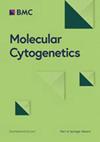杂合性缺失影响 CDK12 突变前列腺癌免疫微环境中的 MHC 表达
IF 1.4
4区 生物学
Q4 GENETICS & HEREDITY
引用次数: 0
摘要
在前列腺癌(PCa)中,MSI 状态、TMB 高值和 PDL1 表达等已确立的生物标志物是免疫疗法良好反应的可靠指标。最近的研究表明,CDK12突变与免疫治疗反应之间可能存在关联;然而,CDK12突变可能影响免疫反应的确切机制仍不清楚。CDK12 突变 PCa 亚群免疫逃避的一个合理解释可能是 MHC 表达减少。利用来自 48 个原发性和 10 个转移性公共领域样本的 CDK12 突变 PCa 基因组数据,以及 53 个中低风险原发性 PCa 的回顾性队列,我们研究了 MHC 基因表达的变化如何影响相关的下游通路。我们根据 MHC 相关基因表达的四分位数对患者进行了分类,并将肿瘤分为 "高 "和 "低 "表达水平。MHC表达途径较高的CDK12突变肿瘤与免疫系统和PD-L1、IDO1和TIM3表达升高有关。与发炎的肿瘤微环境(TME)表型一致的是,数字细胞计量分析发现这组肿瘤中 CD8 + T 细胞、B 细胞、γδ T 细胞和 M1 巨噬细胞增多。相比之下,MHC表达较低的CDK12突变肿瘤表现出与免疫冷TME表型和免疫编辑一致的特征。值得注意的是,MHC表达量低还与影响整个HLA基因簇的6号染色体杂合性缺失(LOH)有关。这些 LOH 事件在肿瘤细胞的主要克隆和次要亚克隆群体中均可观察到。在我们对该研究所 53 例原发性 PCa 病例的回顾性研究中,我们发现 CDK12 基因突变的发生率为 4%(2/53),其中一例肿瘤通过 Sanger 测序证实了这一缺陷。与我们对公共领域数据的分析一致,该肿瘤在 RNA 水平上表现出较低的 MHC 表达。我们需要进行更广泛的研究,以确定HLA表达的降低是与原发性肿瘤普遍相关,还是CDK12突变PCa的特异性特征。这些数据表明,结合 MHC 表达水平和 LOH 状态对 CDK12 基因改变进行分析,可提高对这一可能具有可操作性的 PCa 基因组亚群的预后预测价值。此外,这些发现还突显了探索新型治疗策略的必要性,以提高 CDK12 缺陷 PCa 中 MHC 的表达,从而改善免疫治疗反应。本文章由计算机程序翻译,如有差异,请以英文原文为准。
Loss of heterozygosity impacts MHC expression on the immune microenvironment in CDK12-mutated prostate cancer
In prostate cancer (PCa), well-established biomarkers such as MSI status, TMB high, and PDL1 expression serve as reliable indicators for favorable responses to immunotherapy. Recent studies have suggested a potential association between CDK12 mutations and immunotherapy response; however, the precise mechanisms through which CDK12 mutation may influence immune response remain unclear. A plausible explanation for immune evasion in this subset of CDK12-mutated PCa may be reduced MHC expression. Using genomic data of CDK12-mutated PCa from 48 primary and 10 metastatic public domain samples and a retrospective cohort of 53 low-intermediate risk primary PCa, we investigated how variation in the expression of the MHC genes affected associated downstream pathways. We classified the patients based on gene expression quartiles of MHC-related genes and categorized the tumors into “High” and “Low” expression levels. CDK12-mutated tumors with higher MHC-expressed pathways were associated with the immune system and elevated PD-L1, IDO1, and TIM3 expression. Consistent with an inflamed tumor microenvironment (TME) phenotype, digital cytometric analyses identified increased CD8 + T cells, B cells, γδ T cells, and M1 Macrophages in this group. In contrast, CDK12-mutated tumors with lower MHC expression exhibited features consistent with an immune cold TME phenotype and immunoediting. Significantly, low MHC expression was also associated with chromosome 6 loss of heterozygosity (LOH) affecting the entire HLA gene cluster. These LOH events were observed in both major clonal and minor subclonal populations of tumor cells. In our retrospective study of 53 primary PCa cases from this Institute, we found a 4% (2/53) prevalence of CDK12 mutations, with the confirmation of this defect in one tumor through Sanger sequencing. In keeping with our analysis of public domain data this tumor exhibited low MHC expression at the RNA level. More extensive studies will be required to determine whether reduced HLA expression is generally associated with primary tumors or is a specific feature of CDK12 mutated PCa. These data show that analysis of CDK12 alteration, in the context of MHC expression levels, and LOH status may offer improved predictive value for outcomes in this potentially actionable genomic subgroup of PCa. In addition, these findings highlight the need to explore novel therapeutic strategies to enhance MHC expression in CDK12-defective PCa to improve immunotherapy responses.
求助全文
通过发布文献求助,成功后即可免费获取论文全文。
去求助
来源期刊

Molecular Cytogenetics
GENETICS & HEREDITY-
CiteScore
2.60
自引率
7.70%
发文量
49
审稿时长
>12 weeks
期刊介绍:
Molecular Cytogenetics encompasses all aspects of chromosome biology and the application of molecular cytogenetic techniques in all areas of biology and medicine, including structural and functional organization of the chromosome and nucleus, genome variation, expression and evolution, chromosome abnormalities and genomic variations in medical genetics and tumor genetics.
Molecular Cytogenetics primarily defines a large set of the techniques that operate either with the entire genome or with specific targeted DNA sequences. Topical areas include, but are not limited to:
-Structural and functional organization of chromosome and nucleus-
Genome variation, expression and evolution-
Animal and plant molecular cytogenetics and genomics-
Chromosome abnormalities and genomic variations in clinical genetics-
Applications in preimplantation, pre- and post-natal diagnosis-
Applications in the central nervous system, cancer and haematology research-
Previously unreported applications of molecular cytogenetic techniques-
Development of new techniques or significant enhancements to established techniques.
This journal is a source for numerous scientists all over the world, who wish to improve or introduce molecular cytogenetic techniques into their practice.
 求助内容:
求助内容: 应助结果提醒方式:
应助结果提醒方式:


